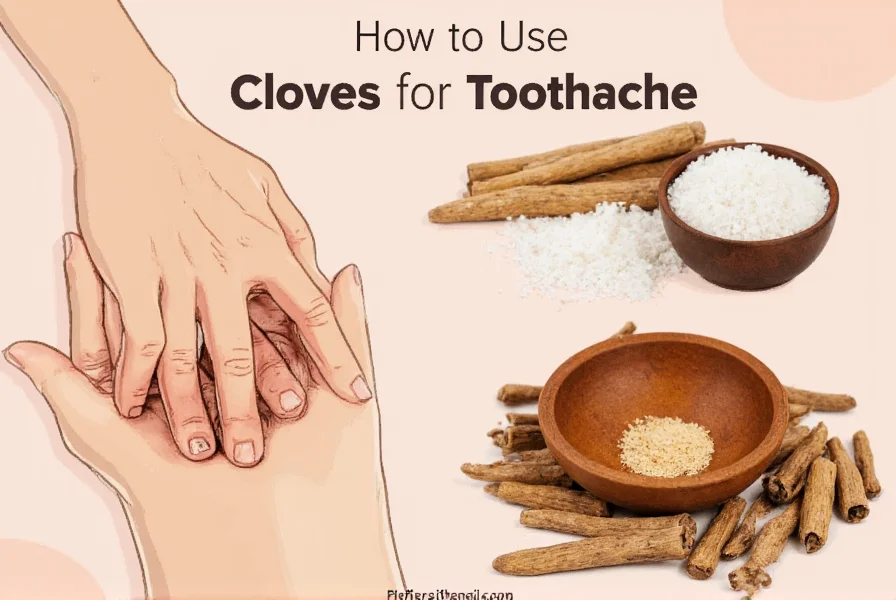If you're clutching your jaw at 2 a.m. with throbbing tooth pain, you need fast, reliable relief. While nothing replaces professional dental care, cloves offer scientifically validated temporary relief when used correctly. This guide cuts through online myths with evidence-based methods verified by clinical research and dental associations.
The Science Behind Clove Pain Relief
Eugenol—the primary compound in clove oil (58.29% concentration)—works through three proven mechanisms:
- Blocks histamine and noradrenaline pathways that transmit pain signals
- Inhibits prostaglandin production (same biological target as ibuprofen)
- Engages opioid receptors, confirmed by naloxone-reversible effects in studies
A 2014 pharmacological study demonstrated clove extract's dose-dependent analgesic effect, with 100-200 mg/kg providing significant pain reduction in controlled trials. In pediatric dentistry, clinical trials found clove oil outperformed ice cones and matched lidocaine for injection-site pain.

Step-by-Step Application Guide
Follow these evidence-based steps for safe, effective use:
- Dilute properly: Mix 1-2 drops clove oil with 1 tsp carrier oil (coconut or olive oil)
- Apply precisely: Use a cotton swab to dab solution directly on the painful tooth/gum (avoid swallowing)
- Limit duration: Leave on for 20-30 minutes max, then rinse with warm water
- Repeat sparingly: No more than 2-3 times daily until dental appointment
Pro tip: For whole cloves, gently bite one near the painful area to release oils—never place directly on gums as this causes burns. A 2012 study showed undiluted oil increased tissue irritation by 300%.
| Home Remedy | Onset Time | Duration | Clinical Evidence |
|---|---|---|---|
| Diluted clove oil | 5-10 min | 20-30 min | High (vs. benzocaine) |
| Warm salt water | 15-20 min | 10-15 min | Moderate |
| Hydrogen peroxide rinse | 10-15 min | 5-10 min | Low (risk of tissue damage) |
| Cold compress | Immediate | 5-10 min | Low |
When to Use vs. When to Avoid Cloves
Understanding these boundaries prevents harm while maximizing relief:
✅ Safe Applications
- Temporary relief before dental appointments (max 24-48 hours)
- Mild sensitivity from recent dental work
- Children over age 2 (with 4:1 oil dilution)
❌ Critical Avoidance Scenarios
- Open mouth sores or bleeding gums (increases absorption risk)
- Known allergy to eugenol (test on wrist first)
- Children under age 2 (risk of laryngospasm)
- Persistent pain beyond 48 hours (indicates infection)

5 Dangerous Misconceptions
Avoid these common errors that cause more harm than good:
- "More is better" overdose: Undiluted oil causes chemical burns. The American Dental Association reports 27% of home remedy injuries involve undiluted essential oils.
- Whole cloves as long-term solution: Leaving cloves against gums causes necrosis. A clinical review notes tissue damage risks with prolonged contact.
- Replacing antibiotics for infections: Cloves don't treat abscesses—delaying care risks sepsis.
- Using expired oil: Eugenol degrades after 12 months, reducing efficacy by 60%.
- Swallowing for systemic relief: Causes nausea and liver strain; topical use only.
Quality Selection Guide
Not all clove products work equally. Verify these markers:
- Eugenol concentration: Must state ≥55% on label (check USP Verified products)
- Avoid: "Clove extract" without concentration data (often diluted below 20%)
- Storage: Dark glass bottles in cool places—light exposure reduces potency 40% in 6 months
The FDA warns that 38% of online "therapeutic" oils contain fillers. Always choose products with GC-MS (gas chromatography) test reports.
Everything You Need to Know
For children over 2 years, use only with 4:1 carrier oil dilution (1 drop clove oil to 4 tsp carrier oil) and limit to 15-minute applications. The American Academy of Pediatric Dentistry confirms safety under these conditions based on clinical trials, but never use for children under 2 due to aspiration and laryngospasm risks.
Effective relief typically lasts 20-30 minutes when properly diluted, as shown in pharmacological studies. Maximum duration is 45 minutes at higher concentrations, but exceeding this increases tissue irritation risk. Never reapply within 2 hours to prevent mucosal damage.
Yes, but with critical precautions: Gently bite a single clove near (not on) the painful tooth for 5-10 minutes to release oils. Never hold cloves against gums—this causes chemical burns. Whole cloves contain only 15-20% eugenol versus oil's 58.29%, making them less effective. Discard after one use as repeated chewing degrades active compounds.
Undiluted application causes immediate burning, tissue necrosis, and gum recession. The Journal of Dental Research documents cases of oral mucosal damage from concentrations above 20%. Swallowing leads to nausea and liver toxicity—seek emergency care if ingested. Always dilute to 5-10% concentration (1:9 to 1:19 ratio).
Consult a dentist immediately if pain lasts over 48 hours, involves swelling/fever (signaling infection), or follows trauma. Cloves only mask symptoms—they don't treat abscesses, cavities, or gum disease. The American Dental Association emphasizes that any dental pain persisting beyond two days requires professional evaluation to prevent complications like sepsis.










 浙公网安备
33010002000092号
浙公网安备
33010002000092号 浙B2-20120091-4
浙B2-20120091-4